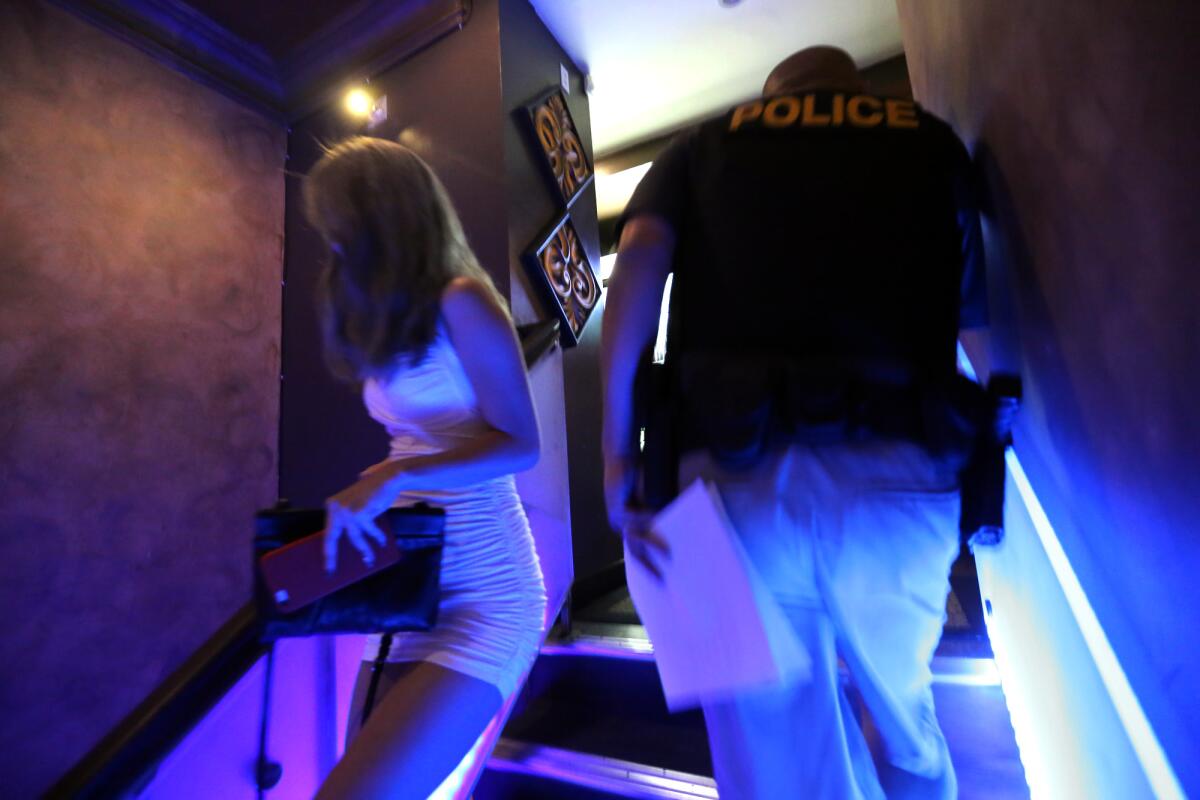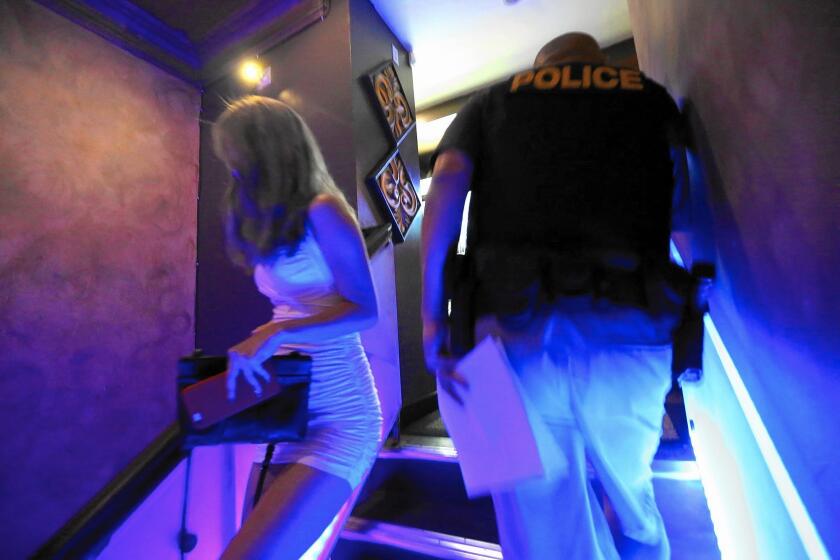Party girls, karaoke, extortion in Koreatown: Trial exposes dark world

The drivers would circle Koreatown, piloting a van filled with party girls. The so-called doumi — decked out in bikini tops, short skirts and tight dresses — were looking to get hired at one of the many karaoke bars that fill the neighborhood.
Doumi drivers, named for the hostesses they transport, could make $40 an hour for each passenger hired to party with karaoke customers. And each month, drivers would pay a portion of their profits to Daekun Cho, a well-known figure in Koreatown.
Authorities arrested Cho last year, and he’s since been charged with 55 counts of extortion, one count of attempted extortion and another of carjacking.
In a federal trial that unfolded in downtown L.A. this month, prosecutors painted Cho, 39, as a gangster who for years extorted monthly protection fees from karaoke bar owners and doumi drivers, many of whom were in the country illegally and did not speak English fluently.
He carried out acts of violence on those who did not pay or who violated his rules, they said in court, including beating one driver with a baseball bat and shooting a doumi in the neck. Prosecutors displayed photos from Cho’s Instagram account and images of his tattoos to identify him as a member of the Grape Street Crips, a predominantly Black gang based in Watts’ Jordan Downs housing project.
By the end of the five-day trial, jurors would walk away with a better understanding of Koreatown’s underbelly and be left to determine Cho’s role in it.
“He wanted everyone in Koreatown to know about his power and that he had to be paid or else,” Asst. U.S. Atty. Jena MacCabe told the jury at the trial’s start.
But defense attorneys argued that drivers and karaoke bar owners paid Cho to be part of an “association,” akin to a union member paying dues, and that in return he kept new clubs and drivers from horning in on their businesses. They said there was no definitive proof Cho was behind the baseball bat beating or the shooting.
“He tried to bring some order into this otherwise chaotic, gray market economy,” Karen Sosa, who represented Cho, said in her opening statement. “Everybody in this case was paying to play.”
Joo Hun Lee testified during the trial that he first met Cho — known in the neighborhood as “DK” — when Lee planned to start a company called Plus driving doumi around Koreatown.
“I was told if you want to start this kind of work, you will have to get permission from an individual called DK,” Lee said through a Korean interpreter. He testified that Cho told him he was “a Korean gangster member.”
A Woodland Hills man has been charged with shaking down owners of karaoke lounges in Koreatown and the hostesses who work there, demands he allegedly enforced with a baseball bat beating, a shooting and other violence.
When Lee started Plus with a business partner, Yun Soo Shin, around 2019, they began paying Cho $100 each month, through cash or at times on Venmo, Lee testified. If he and his partner didn’t pay, he said, “we were not able to work.”
Drivers would pay a starting fee of around $1,500 and then a monthly association fee, according to court testimony.
On any given night, Lee testified, he and Shin would transport 10 to 15 women — whom they recruited through Craigslist — to different karaoke bars in the neighborhood. Sometimes they drove from 8:30 p.m. until 6 a.m. The drivers waited to see if the doumi were hired. If they were not, the drivers didn’t get paid.
“These girls would go inside the clubs, and they’d be paraded in front of middle-aged businessman ... and these middle aged businessmen would decide whether to hire any particular girl based upon her looks, correct?” Cho’s attorney, Mark Werksman, asked.
“Yes,” Lee responded.
Werksman referenced the rules Lee and Shin set for the women they hired. Among them: no sex with customers and no drugs. Each woman was expected to work at least four nights a week.
One rule, displayed in court, instructed doumi not to lie to clients and drivers about money, stating that they only charged $120 plus tips for the first two hours and $60 plus tips for every additional hour.
“Here’s a couple,” the sergeant says, motioning toward two young women shuffling past with doll-like makeup, perfectly coiffed hair and dresses clinging tightly to their petite frames.
Cho also set rules, witnesses testified. If he told drivers not to go to a certain karaoke bar and they went, they would be penalized. The same went for karaoke bar owners who called drivers who Cho told them were banned.
The first penalty was $200. The next, $400, according to texts sent by Cho that were presented in court.
“If u violate our rule one more time,” one text to a driver read, “U gonna see the real demon.”
Shin testified that he and Lee stopped paying in early 2021, after Cho raised prices. Within months, Shin testified, Cho and another man confronted him outside McQueen Karaoke on Western Avenue, dragged him out of his car and beat him with aluminum baseball bats, breaking his arm.
The other assailant then stole the Honda Odyssey that Shin had rented to drop off two doumi that night.
Shin said Cho was wearing a mask with a skeleton on it during the attack, but that he was able to identify him by the top half of his face and his voice. Prosecutors displayed a photo Cho posted on Instagram after the attack wearing what appeared to be the same mask.
The partners closed their business soon after, and Lee left the state.
Another witness, who said he works at Concert Karaoke, testified that he had to pay Cho $600 each month because “he threatened that if we don’t pay, we’ll lose business and he’ll do something to us.” After he stopped paying, he told the jury that Cho threatened him that he better not see him in the neighborhood.
The witness said he stopped going to Koreatown.
Prosecutors played surveillance footage depicting a shooting outside a karaoke bar on July 15, 2022, which they said was carried out by Cho. Police body camera footage showed a doumi who had been shot in the neck saying, “Help, help. Please, help.”
Another doumi driver, who asked not to be identified out of fear for his safety, testified that he had paid Cho every month for four years before deciding to stop. Then, one night in January 2023, Cho punched him in the face and threatened to kill him, he said. The driver began working with investigators and agreed to wear a wire the next time he made a payment.
Cho changed the meeting location three times, asking at one point, “U called cops?” before finally telling the driver to give the cash to an intermediary, according to text messages displayed in court.
During the trial, Werksman and Sosa sought to cast doubt on the credibility of the witnesses, painting them as having motive to lie. They highlighted their immigration status and referenced their potential to obtain U Visas, which give immigrant victims of certain crimes the chance to live and work legally in the U.S. if they cooperate with authorities.
In his closing argument, Werksman called the witness testimony “muddled,” “evasive” and “incomplete.” Werksman referred to the drivers and Cho as “bros.”
“These drivers formed an association to bring a modicum of order to the jungle,” Werksman said.
Werksman added that the payments to Cho were a “pittance.”
“Was that a protection racket or was it a voluntary, if at times slightly chafing and unwelcome, association of street rats who needed to band together to achieve their common goal of exploiting hard-working, sexy young women who earned a few hundred dollars of cash every night abasing themselves for the pleasure of karaoke bar patrons?” Werksman said.
Assistant U.S. Atty. Kevin Butler said the 56 counts tied to an extortion payment are “just a fraction of the real amount of extortion that [Cho] was responsible for.”
“Cho was a predator. He preyed and stalked and hunted — as he called it — his victims: people in Koreatown who he thought either could not or would not go to police,” Butler said during his closing argument. “He gave each one of them an impossible, false choice: Pay him or get banned. Pay him or face the consequence. Pay him or flee the state. Pay him or get ripped out of your car and beaten with aluminum baseball bats. Pay him or get shot in the neck.”
On Tuesday morning, the jury came back with its verdict: Guilty on all counts.
More to Read
Sign up for Essential California
The most important California stories and recommendations in your inbox every morning.
You may occasionally receive promotional content from the Los Angeles Times.












